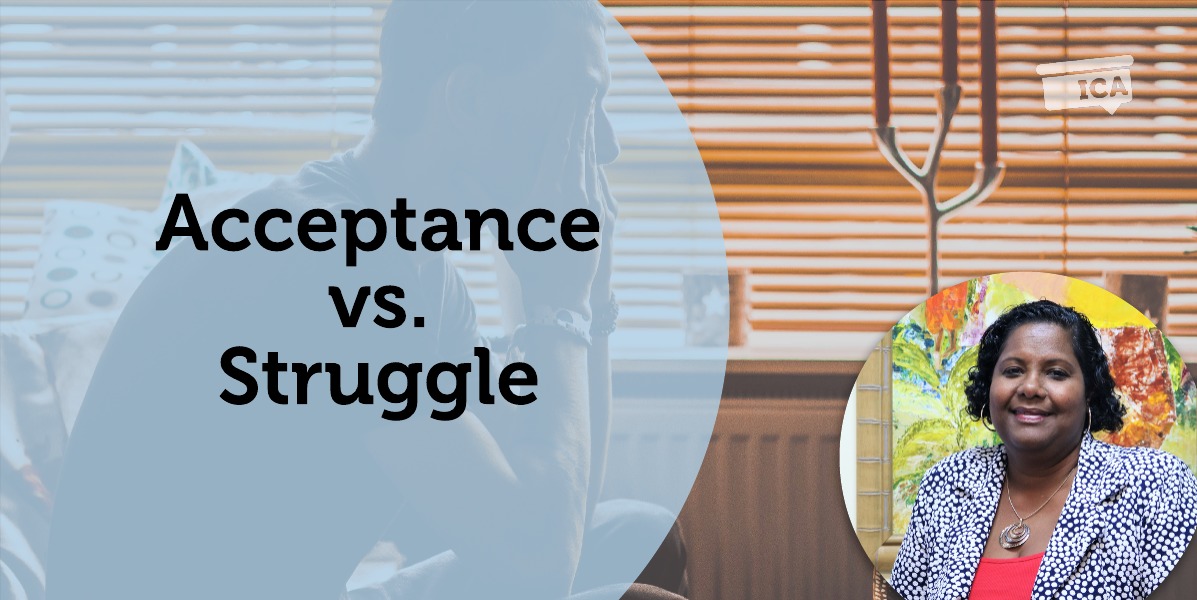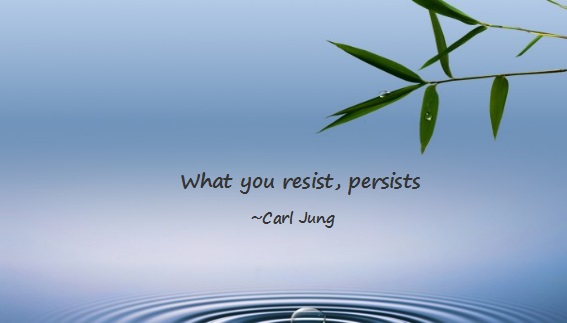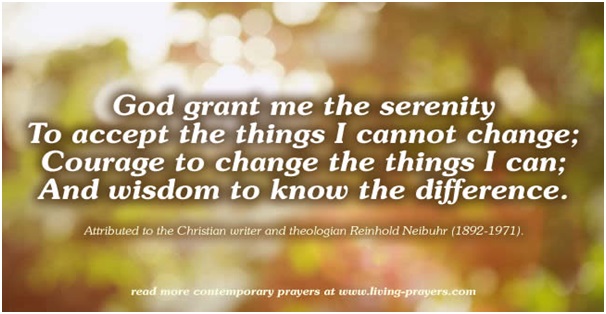
A Coaching Power Tool Created by Isha Reuben-Theodore
(Business Coach, TRINIDAD AND TOBAGO)

Acceptance
There were two power tools that resonated with me in the ICA program, those were
I often wonder why taking action is so challenging even when someone knows what they need to do and the benefits to be derived, for example, why so many of us struggle with weight loss?
And then why when we set a goal we place so much effort and energy (significance) in trying to achieve such goal rather than adopting a lightness approach (believing in ourselves) that allows us to pursue our goals in a meaningful, peaceful and purpose-filled way.
What would it be like If we could pursue our goals by (a)taking the required actions with certainty (b) optimism and confidence, always seeing the light at the end! What would that look like? After giving this considerable thought, and self-questioning, I came up with my power tool of Acceptance v Struggle.
Arising out of my model SELF – Unlocking Value, one of the keystones is self-awareness. From self-awareness, comes the ability to identify the barriers in our situation, but to take the next steps to the barriers we must accept the barriers that exist and the underlying beliefs that support those barriers. We must agree and accept that those beliefs are contrary to our goals or our goals are contrary to those beliefs and therefore decide on the next steps.
This allows us to determine our path, it is our agreement with our self and it is our decision, no one else’s. The actions we take from here on in will have more meaning and passion for us, as they are formulated by us. Without this key step in the process, we will continue to act without truly understanding why we are doing what we do, and so after a while, the importance of those actions fades and possibly stop, resulting in unattainable goals.
Struggle
Struggle according to the definition above is “experiencing difficulty and making a great effort to do something”. Struggle consumes energy which leaves you tired, depressed, with a sense of doubt and lack of confidence. It makes achieving goals stressful and the journey becomes painful. Eventually the passion to pursue these goals dies and goals remain unachieved.
Reframing the perspective of struggle, into accepting and agreeing on one’s situation and the associated underlying beliefs will then result in the freedom to make the choices and take the actions that feel right to us. This allows a lightness to exist resulting in a peaceful and purpose-filled life.
Reframing struggle can be as follows

Self-Application
What can we as coaches do to ensure that we are functioning more in acceptance mode and removing the daily struggle?

Coaching Application
The coach must ask powerful questions and provide effective feedback throughout the coaching process via their coaching model, that will allow the client to reframe their perspective on the situation. Another key element in the coaching process is effective listening. A coach must allow the client time and space to talk out the situation and listen for the underlying limiting beliefs. The client themselves will acknowledge those limiting beliefs as they are verbalised.
By using my power tool of Acceptance v Struggle, the following are some questions that I can ask.
ICA Model – Reframing Perspectives
Introducing Lightness
Considerations
Although many people may benefit from the use of this power tool, there are some points to consider:
Conclusion
There are many areas of my life that I struggle with that has resulted in me having to first reflect on what was giving rise to this struggle, that was leaving me exhausted, frustrated, angry and sad all at the same time. I needed to find a solution to go forward, not just actions but a state of being. So, I thought, if I no longer wanted to struggle, then the first step is accepting the different situations. This resulted in two critical things for me
- Freedom to choose how I wanted to go forward. Doing it my way and believing it will be good.
- Lightness, a sense of joy – that this is my journey and I am the major influencer!
- My belief/faith in God (Jesus Christ) as the author of this journey will be the underlying belief in going forward.
Benefits of Practicing Acceptance
- Acceptance requires us to develop some humility. With acceptance, we acknowledge that we are not in charge of the show and that we are not the director of the world.
- Acceptance helps us to be aware of our experience as it is, rather than how we would like it to be. Acceptance does not necessarily imply that we agree with or condone behaviour or situation. This stance is sometimes referred to as “it is what it is”.
- Acceptance helps us become better problem solvers. Maybe we are refusing to accept that we have an addiction problem, or that our job no longer fulfils us. However, once we acknowledge reality, we are in a better position to consider our options and choose an appropriate action plan.
- Acceptance supports our emotional and physical health. Resistance or denial can throw our equilibrium dramatically out of whack, due to the stress we create. With acceptance, we’re likely to have a lot more energy at our disposal, because we no longer must exert effort trying to avoid, deny, or push away our feelings.
- Acceptance contributes to healthier relationships. Acceptance allows us to assert our own needs, while also accepting that someone else may feel differently. This approach paves the way for mutual respect and cooperation, as opposed to the “my way or the highway” perspective.
- Acceptance is one of the four options we have when facing a challenging situation. We can either leave something, change it, accept, it or stay miserable, as pointed out by psychologist Marsha Linehan, creator of Dialectical Behavioral Therapy. Sometimes we’re not able to alter something or walk away, so acceptance becomes our only viable choice if we want to live with some degree of contentment and equanimity.
- Accepting our feelings helps us to know ourselves better. Without accepting our feelings, we cut ourselves off from our Emotion Mind, which, together with our Rational Mind and Wise Mind, help us to make healthy decisions.
- Acceptance reduces the chances that feelings will resurface later
It’s been said that “when you bury feelings, you bury them alive”. Acknowledging our emotions, without being overwhelmed by them or denying them, is an important aspect of self-compassion, without which it can be almost impossible to live with ourselves. - Acceptance frees us from analysis paralysis. Often, we go around and round in circles trying to figure out why something is the way it is. The first step to moving forward is the acceptance of reality.
- Acceptance contributes to inner peace. When we “let it go” or “let it be”, we relax into reality. We are more able to appreciate all aspects of a situation, without judgment.
- Acceptance can be a gesture of gratitude. Instead of assuming the role of a victim and “why did this happen to me”, we can choose to say “Thank you for this experience. I will learn what I can from it and be part of the solution.”
- Acceptance strengthens us psychologically. If we avoid feelings or a situation, our “courage” muscle atrophies, and we become weaker over time. We also become more inclined to avoid things in the future, due to our avoidance becoming more and more of an ingrained habit. When we accept something, we stand our ground, and we learn that we can indeed take what we thought we couldn’t take. This builds our courage, which we’ll need for the next challenge that comes along.
- Acceptance is an assertion of control, in that we are choosing our attitude and our actions. Once we accept a situation, complete with the uncomfortable feelings this entails, we can shift our attention to what we need to do to live in accordance with our chosen values. I may not like it, but what am I going to do about it?”